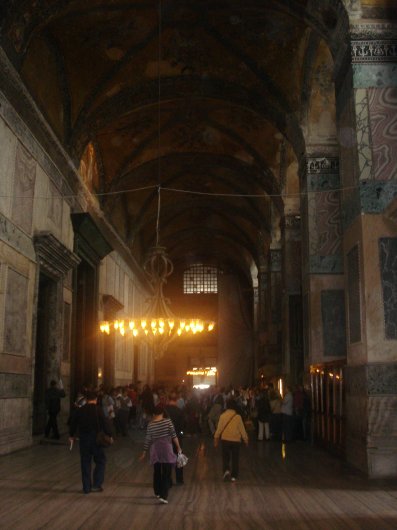 I have spent most of my younger Orthodox life being most concerned about offending God. Myself offending God. Others offending God. My people (us) offending God.
I have spent most of my younger Orthodox life being most concerned about offending God. Myself offending God. Others offending God. My people (us) offending God.
I’ve begun to think that God is most offended by how men act toward one another. Most offended by failure to love one another. By my failure. In other words, it is the offenses I commit against others that are the most grievous – not offenses against God per se. There’s no dichotomy, of course, for the one thing is the other. “Against Thee only have I sinned.” But it seems that failure to love one another is the worst sin.
I don’t mean philosophical or psychological love – how we think or feel about each other in theory or apart from action. It is so common to hold up philosophical “love” or mere warmth as superior to all, and claim that this is what Christ taught. Such an approach dismisses the fathers, who think quite differently. St. Photius, for example, said the highest form of love is to tell the truth. Something similar, I believe, was said by St. Maximus.
 So often, “love”, philosophical love, is held up in dichotomy with whatever the speaker doesn’t like. If you want to discuss getting rid of the pews and the organ, invariably someone will say “love is the most important thing.” If you want to talk of our obligations to fast and pray, you’ll hear “love is over all.” Usually, this is just a way of dismissing any unwanted or unliked discussion or suggestion, and represents an unanswerable superiority. It’s what logicians call a “thought terminating cliche” – a cliche that quells thought itself. In short, it’s talking of love without having love. It’s idle talk. Theory. The presumption is that this vision of love is something the speaker has, or knows of, and so is somehow elevated above the things that concern others, above the conversation.
So often, “love”, philosophical love, is held up in dichotomy with whatever the speaker doesn’t like. If you want to discuss getting rid of the pews and the organ, invariably someone will say “love is the most important thing.” If you want to talk of our obligations to fast and pray, you’ll hear “love is over all.” Usually, this is just a way of dismissing any unwanted or unliked discussion or suggestion, and represents an unanswerable superiority. It’s what logicians call a “thought terminating cliche” – a cliche that quells thought itself. In short, it’s talking of love without having love. It’s idle talk. Theory. The presumption is that this vision of love is something the speaker has, or knows of, and so is somehow elevated above the things that concern others, above the conversation.
But this is precisely not the kind of “love” or love-talk that I mean. I mean how one actually treats other people, including in those moments. Am I superior, or do I take the path of being inferior, as the Fathers teach? I am beginning to think that the biggest concern that God has expressed in the scriptures, in the liturgy, and in the consensus of our Fathers, is for how we treat one another – whether with kindness or mere civility, simple generosity or jealousy. He seems to forgive all manner of offenses against him, but stresses loving one another, and is much harder on those offenses.
I mean nothing especially profound, here. And I am still concerned about offenses against God. But I am beginning, I think, to shift, weighing things a little differently. It is much better that my brother offend God, than that I offend God even more by scorn in my heart for my brother.
 The liturgy says, “With fear of God, with faith and love draw near”. Some enterprising revisionists have expurgated the word ‘fear’, not understanding it, or sharing the Faith of our fathers who prayed this, and saved themselves, and then led us to the Faith. One writer has said, in true Orthodox fashion, that these correspond not only to the psychology of fear, faith, and love, but to the parts of the temple as well as to progress in Orthodoxy. Fear corresponds to the outer part of the temple, the narthex, and to the beginning of Christianity, by which we learn reverence, respect, awe, honor, the height of God and depth of our sin. And we never lose this, if we remain faithful. Faith represents the inner part of the temple, the nave, and standing with the faithful, confessing the true doctrines of the Church and singing true prayers. Love represents the chalice itself, the altar, and our approaching it, keeping in mind the prayers of access that we say (“that with boldness and without condemnation”), and the fullness of life in Christ and therefore life with each other – the peace with God that brings peace among all men.
The liturgy says, “With fear of God, with faith and love draw near”. Some enterprising revisionists have expurgated the word ‘fear’, not understanding it, or sharing the Faith of our fathers who prayed this, and saved themselves, and then led us to the Faith. One writer has said, in true Orthodox fashion, that these correspond not only to the psychology of fear, faith, and love, but to the parts of the temple as well as to progress in Orthodoxy. Fear corresponds to the outer part of the temple, the narthex, and to the beginning of Christianity, by which we learn reverence, respect, awe, honor, the height of God and depth of our sin. And we never lose this, if we remain faithful. Faith represents the inner part of the temple, the nave, and standing with the faithful, confessing the true doctrines of the Church and singing true prayers. Love represents the chalice itself, the altar, and our approaching it, keeping in mind the prayers of access that we say (“that with boldness and without condemnation”), and the fullness of life in Christ and therefore life with each other – the peace with God that brings peace among all men.
I seem to be making a little progress.

 I have spent most of my younger Orthodox life being most concerned about offending God. Myself offending God. Others offending God. My people (us) offending God.
I have spent most of my younger Orthodox life being most concerned about offending God. Myself offending God. Others offending God. My people (us) offending God. So often, “love”, philosophical love, is held up in dichotomy with whatever the speaker doesn’t like. If you want to discuss getting rid of the pews and the organ, invariably someone will say “love is the most important thing.” If you want to talk of our obligations to fast and pray, you’ll hear “love is over all.” Usually, this is just a way of dismissing any unwanted or unliked discussion or suggestion, and represents an unanswerable superiority. It’s what logicians call a “thought terminating cliche” – a cliche that quells thought itself. In short, it’s talking of love without having love. It’s idle talk. Theory. The presumption is that this vision of love is something the speaker has, or knows of, and so is somehow elevated above the things that concern others, above the conversation.
So often, “love”, philosophical love, is held up in dichotomy with whatever the speaker doesn’t like. If you want to discuss getting rid of the pews and the organ, invariably someone will say “love is the most important thing.” If you want to talk of our obligations to fast and pray, you’ll hear “love is over all.” Usually, this is just a way of dismissing any unwanted or unliked discussion or suggestion, and represents an unanswerable superiority. It’s what logicians call a “thought terminating cliche” – a cliche that quells thought itself. In short, it’s talking of love without having love. It’s idle talk. Theory. The presumption is that this vision of love is something the speaker has, or knows of, and so is somehow elevated above the things that concern others, above the conversation. The liturgy says, “With fear of God, with faith and love draw near”. Some enterprising revisionists have expurgated the word ‘fear’, not understanding it, or sharing the Faith of our fathers who prayed this, and saved themselves, and then led us to the Faith. One writer has said, in true Orthodox fashion, that these correspond not only to the psychology of fear, faith, and love, but to the parts of the temple as well as to progress in Orthodoxy. Fear corresponds to the outer part of the temple, the narthex, and to the beginning of Christianity, by which we learn reverence, respect, awe, honor, the height of God and depth of our sin. And we never lose this, if we remain faithful. Faith represents the inner part of the temple, the nave, and standing with the faithful, confessing the true doctrines of the Church and singing true prayers. Love represents the chalice itself, the altar, and our approaching it, keeping in mind the prayers of access that we say (“that with boldness and without condemnation”), and the fullness of life in Christ and therefore life with each other – the peace with God that brings peace among all men.
The liturgy says, “With fear of God, with faith and love draw near”. Some enterprising revisionists have expurgated the word ‘fear’, not understanding it, or sharing the Faith of our fathers who prayed this, and saved themselves, and then led us to the Faith. One writer has said, in true Orthodox fashion, that these correspond not only to the psychology of fear, faith, and love, but to the parts of the temple as well as to progress in Orthodoxy. Fear corresponds to the outer part of the temple, the narthex, and to the beginning of Christianity, by which we learn reverence, respect, awe, honor, the height of God and depth of our sin. And we never lose this, if we remain faithful. Faith represents the inner part of the temple, the nave, and standing with the faithful, confessing the true doctrines of the Church and singing true prayers. Love represents the chalice itself, the altar, and our approaching it, keeping in mind the prayers of access that we say (“that with boldness and without condemnation”), and the fullness of life in Christ and therefore life with each other – the peace with God that brings peace among all men.